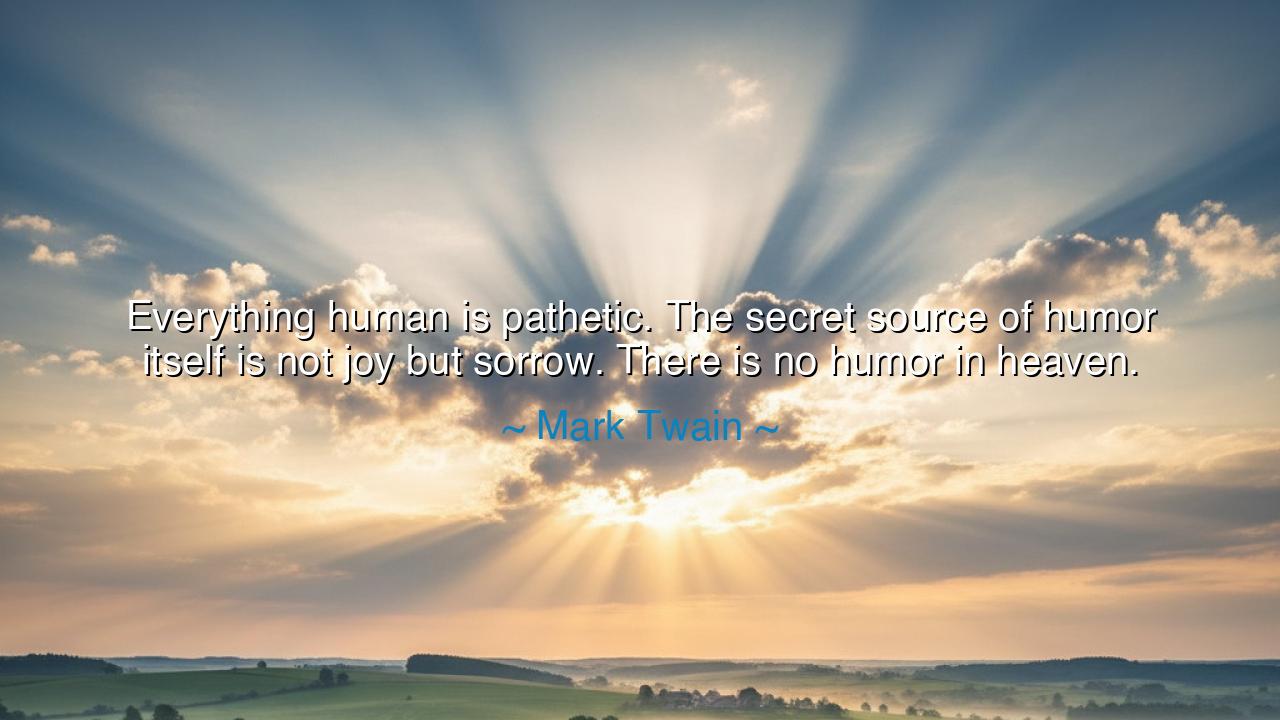
Everything human is pathetic. The secret source of humor itself
Everything human is pathetic. The secret source of humor itself is not joy but sorrow. There is no humor in heaven.






In the voice of timeless reflection, Mark Twain, the great observer of human folly and human grace, once declared: “Everything human is pathetic. The secret source of humor itself is not joy but sorrow. There is no humor in heaven.” These words, woven from the fabric of both laughter and lament, reveal the paradox at the heart of existence — that humor, which seems so light, so free, is born not from joy, but from pain remembered and understood. In Twain’s insight, we glimpse the soul’s strange alchemy: the power to turn suffering into laughter, and despair into wisdom.
Twain, whose life was filled with triumph and tragedy, spoke these words not as a cynic, but as one who had seen both the heights of human hope and the depths of its grief. He buried loved ones, endured poverty, and wrestled with disillusionment, yet he never ceased to laugh — and more importantly, to make others laugh. In his laughter was not denial, but defiance. He knew that humor is born when the human heart looks upon its suffering and, instead of breaking, chooses to smile. It is the rebellion of the spirit against despair — a way of saying, “You may wound me, but I will not lose my light.”
When Twain calls “everything human pathetic,” he does not mean worthless or shameful. In the ancient sense, “pathetic” means full of feeling — subject to emotion, to limitation, to pain. To be human is to stumble, to dream, to fail, and to rise again. It is to live in imperfection, ever aware of mortality. And it is precisely this fragility that gives birth to humor. Angels and gods, perfect and serene, may not need laughter, for they know no error, no embarrassment, no regret. But mortals — creatures of dust and desire — find in laughter a way to bear the unbearable. There is, as Twain says, no humor in heaven, because there is no pain to overcome there. Laughter is the gift of the broken.
History itself bears witness to this truth. Consider Winston Churchill, who faced war and ruin with wit as sharp as his courage. In Britain’s darkest hours, he joked, “If you’re going through hell, keep going.” His humor did not spring from comfort but from struggle; it was a sword against despair. Like Twain, he understood that laughter is not frivolous — it is armor. It is what allows nations and individuals alike to survive the weight of sorrow without surrendering to it. Humor, in this sense, is sacred, for it transforms the tragic into the bearable, and the unbearable into the meaningful.
Twain’s philosophy also carries a deeper moral wisdom: that one must not seek to escape sorrow, but to understand it. When we can laugh at our suffering, we begin to master it. The fool laughs without wisdom; the wise laugh because they have suffered and learned. This is the laughter of healing — the laughter of a soul that sees clearly the absurdity of life and yet embraces it still. It is the same spirit that moved the ancient philosophers, who said, “To laugh at yourself is to know yourself.” For in laughter, the ego dissolves, pride humbles, and truth reveals itself.
But this understanding also comes with compassion. If humor springs from sorrow, then every laugh carries an echo of pain. The truly humorous soul, therefore, is also the most empathetic. Twain’s humor was often sharp, but beneath it flowed a current of tenderness for the human condition — a love for mankind precisely because of its weakness. He laughed not at humanity, but for it. For he knew that in every jest lies a silent prayer: that we might endure our sorrows and find beauty, even in our imperfection.
So let this wisdom be your guide, dear listener: do not fear sorrow, for it is the soil from which joy grows. When life wounds you, do not close your heart — for from the cracks of the heart, laughter is born. Learn to look upon your pain not with bitterness, but with understanding. Let your trials teach you to smile, and your smile teach others to endure. For humor, as Mark Twain knew, is not the denial of suffering — it is the highest triumph over it.
And remember this final truth: there is no humor in heaven, because there is no struggle there. It is only here, in the chaos and beauty of human life, that laughter becomes divine — the sound of mortal souls turning sorrow into light.






AAdministratorAdministrator
Welcome, honored guests. Please leave a comment, we will respond soon